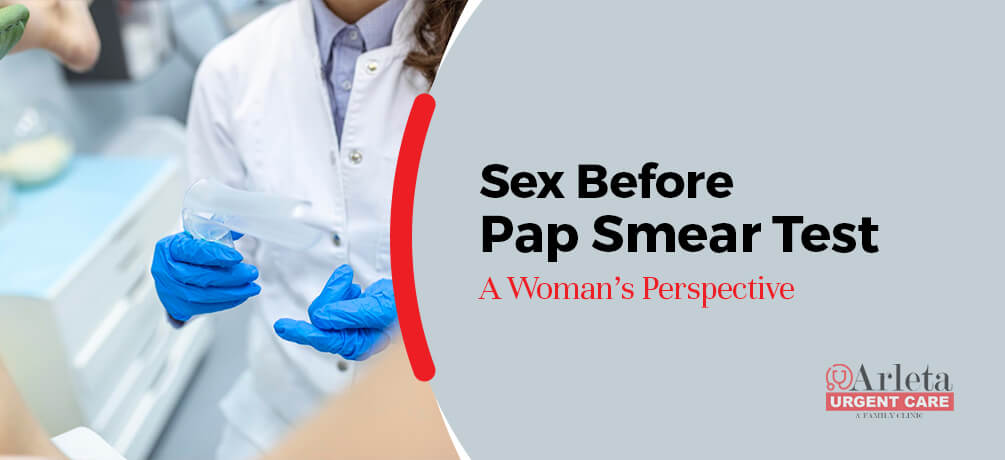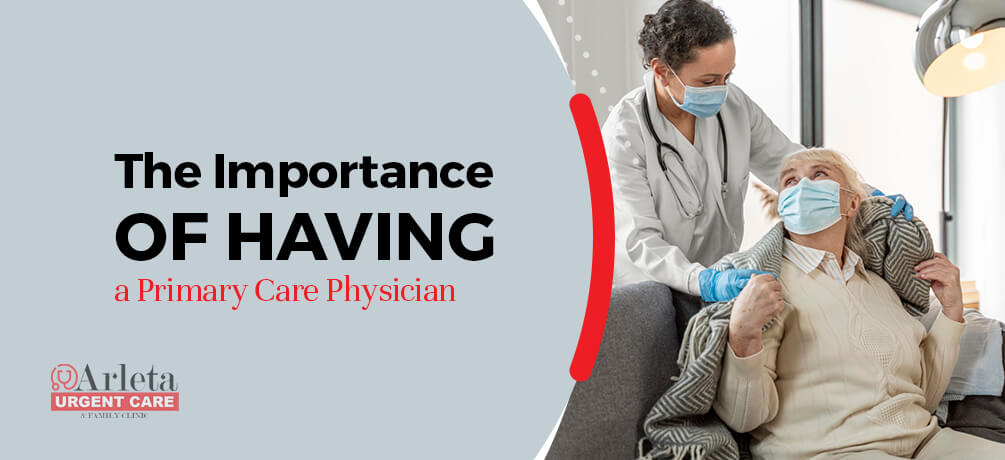Sex Before Pap Smear Test: A Woman's Perspective
Home / Pap Smear Testing / Sex Before Pap Smear Test: A Woman's Perspective
November 12, 2022 | Category : Pap Smear Testing | Author: Arleta Urgent Care

One of the most dreaded forms of cancer among women is cervical cancer. Globally, it is the fourth most common cancer affecting women. HPV, or human papillomavirus, is the type of virus that is often known to cause cervical cancer. The group term, human papillomavirus, is used for over 100 viruses. In some cases, the HPV virus can resolve itself without causing complications. But, in other cases, this virus can cause symptoms such as benign growths, genital warts, and even cervical cancer in women. This article will examine the relationship between Sex, HPV, and cervical cancer. We shall also explain to you the various ways to avoid getting cancer. Sex before a pap smear test is not encouraged.
What is the relationship between Sex and cervical cancer?
Cancer that develops in the lower end of the uterus near the vaginal canal or the cervix is called cervical cancer. The main culprit of cervical cancer is HPV. HPV often transmits from one person to another through sexual intercourse or sexual activities. Persons engaging in sexual activities are at high risk of cervical cancer. Another group at a higher risk of cervical cancer is previously infected with chlamydia. The reason is that this type of cervical cancer STD often promotes HPV growth.
Not all cervical cancer risk factors are related to Sex. Smokers are two times more likely to get cervical cancer than non-smokers. Based on research, cervical cell DNA is often damaged by tobacco byproducts. Research also reveals that smokers with HPV infection are at a higher risk of getting cervical cancer than those who don't because they have a higher viral load in their cervix. Which often leads to cervical cancer developing much faster. The doctor will ask you not to engage in Sex before a pap smear test.
The chance of getting cervical cancer also increases in people with a weakened immune system. Immunity may go down in people who suffer from the following:
- Autoimmune conditions
- Cancer
- HIV
- Have undergone an organ transplant
- Chemotherapy or immune-suppressing drugs
A compromised immune system makes it hard to fight and defeat tumor growth, cancer cells, and viruses.
See More: How Does the Coronavirus Antibody Test Work?
Do you need a pap smear if you are not sexually active?
Can you get HPV without having Sex? Although the chances of getting cervical cancer are low when you don't have Sex, you may still get it. HPV virus not only lives in the genitals but also in other areas of the body. They may also live in the throat, mouth, or anus. You can also get it through skin-to-skin contact while having sexual intercourse or through oral Sex. Sexual penetration is not the only way to transmit the HPV virus. Even though you are not currently sexually active, you may still get the HPV virus from previous sexual activities.
Unlike warts, which consistently show apparent symptoms, HPV hardly shows any signs. It can later manifest in the cervix area as abnormal cells after staying in the body for several years. Abnormal cervical cells may develop into precancerous or cancerous cells. The risk of getting HPV or cervical cancer is relatively minimal for people who don't engage in anal, vaginal, or oral Sex. You may still get the HPV virus through Sex, even though it is not penetrative Sex. Sex before a pap smear test may alter the final results.
How is a pap smear test conducted?
If you are younger than 21, there is no need to undergo regular pap smear tests. When a person reaches 21 years, she should start going for Pap Smear tests even if she doesn't engage in sexual activities. Besides screening for cervical cancer, a pap smear test may also diagnose benign conditions like cervical inflammation or infection.
A Pap Smear test is not painful. This cervical cancer screening test is noninvasive and only takes a few minutes to be performed by a gynecologist. The test collects cervical samples from the patient's genital region. To make the results more accurate, the doctor will ask the patient to avoid Sex before the pap smear test. A spatula or a swab is used to scrape the end of the uterus during this procedure. After collecting the cervical cell, samples are put on a slide and sent to a lab for examination.
Pap Smear tests are often done with HPV tests, which are essential for cervical cancer screening. This vital test allows the doctor to look for the HPV virus in the cervical cells. HPV is detectable in the cervix a year after infection. Unlike the pap smear test that only detects abnormal cells that have already developed, an HPV test can catch or detect disease before cervical cells become precancerous, which allows you and your doctor to monitor cervical cancer signs.
HPV tests are still vital cervical screening tools for detecting the HPV virus in the cervical cells, even though you are not currently sexually active. You can choose to undergo a primary HPV test, which is often performed on its own, or take it as a co-test by combining it with a pap test. There isn't any significant difference between undergoing a pap smear test and a co-test.
Cervical cancer screening guidelines
Both co-testing and primary HPV tests are supported by cervical cancer screening guidelines in the United States as screening tools for cervical cancer. The guidelines stipulated by the American Cancer Society (ACS) for cervical cancer are as follows :
For women aged 25 to 65 years
- Primary HPV testing every five years or
- Pap smear alone every three years
- Co-test every five years that combines a Pap smear with an HPV test
For women over 65 years
The past medical history and individual risk factors will determine whether a 65-year-old and above woman continues or discontinues pap smear testing.
A woman who has reached 65 years can stop going for Pap Smear tests if she has been going for Pap Smear tests for the last ten years and getting the expected results. Women without a history of abnormal cells in their cervical region may also discontinue pap smear tests.
If a woman stops taking the pap smear test, she should not start it again. Women who have undergone a procedure known as total hysterectomy should discontinue pap tests. However, pap smear tests should continue if the process was done to treat cancer or precancerous cells.
The American Society for Colposcopy and Cervical Pathology (ASCCP) encourages both kinds of cancer screening.
Pap tests should be contacted more frequently in women who get positive or abnormal tests.
Several factors determine how frequently a pap test is done. These factors include:
- Cervical cancer risk factors
- Sexual history
- Pap smear test results history
You need to understand that frequent changes are made now and then by the ACS or other organizations on cancer screening guidelines. You, therefore, need to consult with your doctor, who will guide you on the proper testing frequency.
How often should a Pap smear be repeated?
You will need to refrain from having Sex before a pap smear test to get accurate results. Most gynecologists will recommend going for Pap Smear tests after every three years if you are between 21 to 65 years old. If the HPV and Pap Smear tests are performed during cervical cancer screening, and a woman is over 30 years, she can stay for five years before going for another cancer screening test.
Doctors may sometimes prefer the HPV test instead of a pap smear. No matter how old you are, you may be forced to get tested more frequently if you have certain risk factors. Below are some of the risk factors:
- Women suffering from HIV
- Pap Smear test results that showed abnormal or precancerous cells
- When a person has a weak immune system that makes her prone to various diseases and infections
- If a woman smokes cigarettes often.
- If a person was exposed to diethylstilbestrol (DES) before she was born
How to lower the risk of cervical cancer?
If you undergo the HPV diagnosis and it turns out you have the HPV virus, it doesn't necessarily mean you have cancer. If you don't get the HPV vaccine, you may get HPV at some point in your life, especially if you engage in frequent sexual activities.
Although the HPV virus comes in many subtypes, the ones associated with cervical cancer are HPV 16 and 18. About 70 percent of all cervical cancers come from these two HPV subtypes. The HPV vaccine protects you from all HPV subtypes, including 16 and 18.
At the moment, it is recommended by health professionals that HPV vaccination should be done on persons between 11 and 12 years. The doctor may advise you when to vaccinate against HPV if you are between 11 and 26 years old. The HPV vaccine works more effectively on persons not yet infected with the HPV virus.
The HPV vaccine does more than protect from cervical cancer. It also saves you from contracting cancer of the penis, vagina, vulva, throat, mouth, and even anus. Besides getting vaccinated against HPV, the following steps may help you to avoid getting cervical cancer:
- Smoking or using tobacco alters the DNA of cells found in the cervical region. To lower the risk of getting cervical cancer, you need to consult with your doctor about coming up with a smoking cessation plan.
- Use protection when having sexual intercourse. Using condoms when having Sex can protect you from getting the HPV virus.
- Get tested or screened against cervical cancer more frequently. Undergoing the pap test or HPV test helps detect abnormal cells that can cause cervical cancer before symptoms show up.
The Bottom Line
The main culprit responsible for causing cervical cancer is the human papillomavirus or HPV. This virus is transmitted sexually. If you engaged in frequent sexual activities in the past, you might have contracted the HPV virus. HPV doesn't only spread through sexual intercourse. Other types of sexual orientation, such as oral Sex or skin-to-skin contact during Sex, may also transmit the HPV virus. Women who are at the lowest risk of getting the HPV virus are those who have never engaged in any sexual activities. Their chances of getting cervical cancer are also scarce.
If you have any questions about the pap smear test, please do not hesitate to contact us at 818-746-2626 or Schedule an Appointment.




